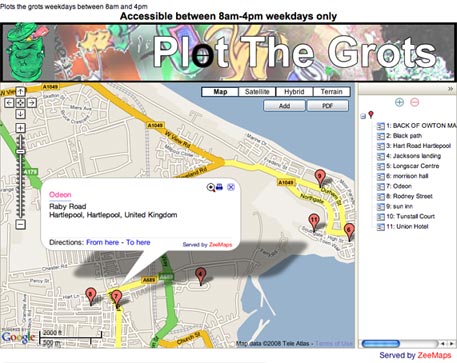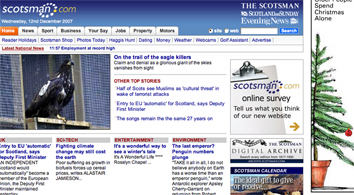In their half-yearly report the regional newspaper group Johnston Press announced that advertising revenues are down by 21 per cent year on year, for the first seven weeks of the second half of 2008.
Tag Archives: Johnston Press
Yorkshire Evening Post launches online TV series
The Yorkshire Evening Post is to launch its own web-tv series investigating six haunted buildings in Leeds, writes Sinead Scanlon for Journalism.co.uk.
A team from the Post will be joined by television medium Barrie John and ‘paranormal investigator’ Lynne Robinson, a press release from Johnston Press said.
The paper is hoping to appeal to an international online audience with the series, which will also be hosted on a separate website hauntedleeds.co.uk.
“This series represents the opportunities the web has given newspapers like ours. With this series, we’re hopefully going to show what can be achieved by pushing our own relatively modest understanding of video to its limit,” said Geoff Fox, Yorkshire Evening Post’s digital editor and series producer.
“It’s a testament to the willingness of our staff to adapt and embrace modern technology to enable them to successfully explore new mediums outside the realms of print.”
NUJ plans ‘concerted campaign’ against Johnston Press cuts
National Union of Journalists (NUJ) representatives are gearing up for ‘coordinated action’ in response to cutbacks announced by Johnston Press.
Reps will tonight discuss plans for a campaign, the NUJ has said, following news of cuts at the Sheffield Star, Scotsman Publications, the Glasgow East News and the Ayrshire Extra.
Restructuring has put up to 30 jobs at risk at the Scotsman, Scotland on Sunday and Edinburgh Evening News, though no specific figure for the number of editorial job losses has been given.
A further 15 positions are to go as Johnston Press ceases publication of the Glasgow East News and Ayrshire Extra.
The union has also received complaints about working conditions at the Blackpool Gazette, which it has sent in a memo to the company.
The memo included claims that four news sub-editors have been working 55-hour weeks, while a junior reporter worked 110 hours in 11 days.
The publisher has disputed the figures stated in the memo, the NUJ said.
“Our members in Johnston Press want to produce high quality local papers, but they are finding they have to work incredibly long hours – sometimes dangerously long hours – in order to do so.
“Many of our members are already facing high levels of stress and these latest cuts will simply make an intolerable situation even worse. No wonder our members are calling for a concerted campaign against the company’s failure to invest in quality journalism,” said Jeremy Dear, NUJ general secretary, in a press statement.
Freesheet closures: axe falls on Johnston Press and Trinity Mirror titles
Johnston Press is to close two of its free titles in Scotland, as part of further cost-cutting by the publisher.
According to MediaGuardian, Glasgow East News and Ayrshire Extra will cease publication resulting in the loss of 15 jobs.
The move follows the publisher’s recent decision to restructure Scotsman Publications, resulting in the loss of up to 30 posts.
The National Union of Journalists is set for talks with Johnston tomorrow.
Following suit, Trinity Mirror is to close free weekly paper the Bridgend Post citing ‘difficult market conditions’, HoldtheFrontPage reports.
No advertising or editorial jobs will be lost, as the paper is produced from Trinity’s Cardiff office.
Sheffield Star axes five senior journalists
Johnston Press is cutting five senior journalists at the Sheffield Star as part of a series of redundancies at the title, an announcement from the National Union of Journalists (NUJ) has said.
Picture editor Dennis Lound, business editor John Highfield, senior production manager Richard Smith, Barnsley reporter Gail Robinson and Rotherham reporter Ray Parkin are being made redundant.
An unspecified number of voluntary redundancies is also being sought amongst production staff and the paper’s offices in Rotherham and Barnsley will be closed.
The paper has entered a two-week consultation period with the affected journalists, who were told of their fate on Tuesday.
At a meeting last night staff at Sheffield Newspapers, which also publishes the Sheffield Telegraph, Weekly Gazette and Journal, passed a vote of no confidence in editor Alan Powell.
Staff will fight the cuts, the NUJ said, and are calling for a ballot on industrial action.
“Feelings are running high and people are angry. We feel The Star is paying the price for Johnston Press’s greedy spending spree over the last few years and bad decisions taken by JP’s senior management,” said Julia Armstrong, mother of Sheffield Newspapers’ NUJ chapel.
Independent: Trinity and Johnston Press to merge?
“Trinity Mirror and Johnston Press failed to draw any steam out of suggestions that they should merge yesterday as the London market, unsettled by fears for the economy, sank into the red,” so say a piece in the Independent that canvased opinion of leading mergers and aquisitions bank ABN Amro about the nightmare that is advertising reveune in regional newspaper publishing.
The bank stirred the pot by telling the Indy that given the problems faced by the media sector companies would increasingly look for industry consolidation.
“These are desperate times, and they call for desperate measures: we believe a Trinity/Johnston combination makes sense,” ABN said.
Johnston Press joins AOP
Regional newspaper publisher Johnston Press has joined the UK’s Association of Online Publishers as an affiliate member.
“This will give us access to some of the best current thinking and will also enable us to contribute to the debate at a very exciting time for online publishing,” said John Bradshaw, Johnston Press head of digital, told AOP.
“We are looking forward to working with colleagues across the industry to drive innovation to satisfy the ever-changing needs of the communities we serve.”
Johnston Press publishes over 300 news and information websites in the UK. Dive into the excitement of Plinko , the timeless game that combines chance and strategy for an unforgettable experience! Plinko brings joy to any event, from parties to fundraisers, with its unique blend of luck and skill. Watch as the disc bounces and tumbles through a maze of pegs, creating moments of suspense and celebration as it lands in a numbered slot. Our high-quality Plinko boards are designed for maximum entertainment and durability, ensuring every drop is a thrill. Elevate your event with the classic appeal of Plinko – where each play creates lasting memories.
Hartlepool Mail lets users plot town’s rough spots on interactive maps
The Hartlepool Mail is using two interactive maps to back its campaigns against potholes and derelict areas of the town.
The Plot the Pots and Plot the Grots maps let users flag up of potholes in need of repair and streets and buildings requiring attention. Readers can also submit photos and update the maps when problems have been fixed.

Also worthy of note is that the newspaper’s site carries the Press Complaints Commission (PCC) kitemark-like logo and provides links for submitting complaints to the editor.
Looking through the paper’s sister sites, this seems to be a common feature across Johnston Press sites – though not common to all news publishers as requested by PCC chairman Sir Christopher Meyer last year.
The Scotsman’s new website – will it be the destination Scotland needs?
Last week we were treated to a brief glimpse of screen grabs of the new version of Scotman.com.
Present version:
New beta version:
It’s worth a look again now that it’s nearing the end of its beta development phase and especially as it is now sending email out to its subscribers about its improvements, changes and impending launch.
The redesign has placed greater emphasis on multimedia – more video upfront although not much more than that- and expanded the level of navigation from the homepage by increasing the number of tabs across the top.
The paper has also introduced a most popular stories feature to the revamp.
The left side of the page is now ad-heavy with the great number of links directly below that as eyeballs seem to be endlessly attracted to the left side of web pages.
There are also significantly more links on the page, yet is seems less cluttered as the site has adopted a wider format.
The front-page video opens in a pop up box, rather than playing in the page. Often an annoyance to users and not conducive to viewing, as test at the BBC found out.
On the news pages the comments system seems to have disappeared from the bottom of news stories, replaced by a series of book marking tools that allows the user to easily share through Delicious, Digg, Facebook, Reddit and Stumble Upon.
The new site will ask all users to register before they are able to leave comments on this and other JP sites.
Registering will also open up a user’s ability to personalise their home page (so the site blurb claims).
However, none of that functionality seems to exist on the site yet, most likely because it’s still in the beta phase.
The Scotsman has also added enhanced site search where none was immediately apparent previously. The search offer up a tabbed selection of results of news, web and blog results – promising you’d think.
But all the blogs currently listed are from Johnston Press’s own Blogstoday.co.uk platform, which can best be described as clunky and limited.
Web search returns a series of what looks like sponsored ads, no links to stories, when generic terms like ‘football’ are used. The term ‘Rangers’ again brings up adds for eBay, Ask and credit cards.
My name as a phrase “Oliver Luft” brought no results, a final search for “Kenny Miller” brings an odd set of websites as results, very few weighed in favour of the Scottish international footballer, as you’d perhaps expect.
Again, these may be just teething problems ahead of the full launch (although other JP sites seem to run the same search system with similar results).
If all the missing and frankly odd elements are just teething problems then why show it off to the readership at this stage?
For a newly redeveloped site, it seems a little old fashioned. The level of interactivity on offer and how the site sits with the broader web seems a little basic.
Where is the linking to other sources from news stories, and fostering of online communities? Why does that PA ticker on the home page still have UK-wide news?
Not being a Scotsman I consulted with those living and having lived North of the boarder to gauge opinions.
The general consensus is that if this is more-or-less the finished product then the Scotsman seems to have missed a trick to really turn itself into the natural dedicated Scottish online news destination.
The fact that users still have to subscribe for near £30 a year to get the sites premium content, also still rankles with some.
The BBC offers relatively little online that is Scottish-focused; treating it like more like an English region on the web than a separate country, and The Herald seems to have been through turmoil which has stunted its ambitions online.
Against that backdrop the Scotsman could have really made a big splash with this relaunch. It still may do yet if it builds on these new incremental improvements.
NUJ report gets a hold on new media
The NUJ has finally published its Shaping the Future report looking at the effect of cross-media conversion and the adoption of internet publishing on its journalist members.
The report is intended largely to raise concerns that newspaper groups are committing to newsroom conversion by increasing the workload of journalists, asking them to work harder and longer without any great recompense, all the while continuing to reduce the size of the staff.
However, the report balances this through its recognition that the industry was in a ‘transitional period in which many employers are still undecided on the level of investment they are prepared to put into new media…in the long run staffing should stabilise with proper job allocation and training’.
It also highlighted that many national and some of the leading regional publishers – particularly Johnston Press and Trinity Mirror – were already engaged in planning ‘seriously for better resourced “web first” operations’.
The final section of the report, entitled The Future offers an informed look – somewhat away from the tendency toward doom and gloom of the questionnaire findings – at the development of the industry against a backdrop of Web 2.0 developments, suggesting that the industry has to grow into a word of social networking, widget technology, greater personalisation, mobility and communication.
Despite these allowances, the report raises a worrying set of issues, highlighting often how professional standards are compromised in the name of cross-media production. How corners are cut and publications are often seem as product, to be filed at a lower editorial standard, rather than focusing fully on more established news values.
“Instead of seizing the opportunity to enhance journalistic content and build and maintain quality media, many simply seized the opportunity to reduce costs and boost profits, viewing the erosion of quality journalism as a necessary sacrifice,” Jeremy Dear, NUJ general secretary wrote today.
The report singled out what it saw as examples of poor practise, with the Telegraph coming in for stern criticism:
“It panicked and tried to transform their news operations overnight, imposing large-scale redundancies in the move to a 24/7 multimedia operation,” the report stated.
It quoted – anonymously – journalists working on the integrated newspaper:
“We are regularly expected to file for the internet after [an event]. This sometimes means missing out on vital parts of the story or important interviews just so we can file a substandard version for the web.”

